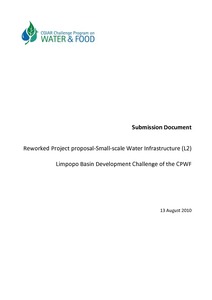Resource information
The Limpopo Basin is prone to frequent droughts and short season rainfall making agricultural production a very risky enterprise. The need assist to farmers and rural communities to optimize the utilization of low rainwater and existing SWI to boost agricultural productivity, standard of living and reduce poverty.
A multi-level participatory approach shall be used to assess the causes of the SWIs failure in all the four basin countries. Rehabilitation guidelines which shall consider governance, institutional issues, technical, environmental compliance issues and multiple use systems (MUS) shall be produced by a team of multi-disciplinary experts. Additionally, the study shall explore alternative design approaches of new SWIs that will support multiple use systems (small-scale cash crop irrigation schemes, domestic use, livestock watering, aquaculture, rural industries, etc), improve livelihood of the rural community, improved food security and nutritional requirements for children and women.
Field trials and demonstrations of rain water harvesting (RWH) techniques shall be done with the utmost cooperation of the farming community as a way of empowering them, fostering ownership and ultimate adoption of the recommended technologies


